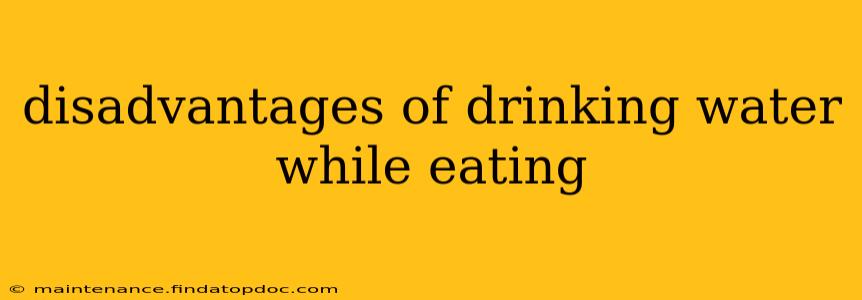The age-old debate: should you drink water while eating? Many believe it dilutes digestive juices, hindering nutrient absorption. Others see it as a simple hydration strategy. Let's delve into the potential disadvantages of drinking water with meals, separating fact from fiction.
While the idea that drinking water with meals is universally harmful is largely unfounded, there are some potential drawbacks for certain individuals and in specific circumstances. It's crucial to understand that these are not hard-and-fast rules applicable to everyone, but rather points to consider based on individual needs and digestive sensitivities.
Does Drinking Water While Eating Dilute Digestive Juices?
This is perhaps the most common concern. The argument is that water dilutes stomach acid and digestive enzymes, reducing their effectiveness in breaking down food. While it's true that adding water to your stomach will dilute the gastric juices to some extent, the body is remarkably efficient at regulating its digestive processes. Your stomach produces more digestive juices as needed, compensating for the dilution effect. The impact on digestion is likely minimal for most healthy individuals. However, those with already compromised digestive systems may experience more noticeable effects.
Can Drinking Water With Meals Cause Bloating and Digestive Discomfort?
For some people, drinking large quantities of water with meals can lead to bloating and discomfort. This is particularly true if you already have a tendency toward bloating or digestive issues. The increased volume in your stomach can put pressure on your digestive system, leading to feelings of fullness, discomfort, and even gas. This is more related to the volume of liquid ingested rather than the act of drinking water itself. Moderation is key.
Can It Interfere with Nutrient Absorption?
The idea that water washes away nutrients before they can be absorbed is a misconception. Nutrient absorption primarily occurs in the small intestine, where the process isn't significantly impacted by water intake during the meal itself. However, consistently consuming excessive fluids with meals could potentially dilute the concentration of some nutrients, though this effect is generally negligible. Focus on a balanced diet rich in diverse nutrients rather than worrying excessively about this factor.
What About People With Specific Digestive Conditions?
Individuals with certain digestive disorders, such as gastroparesis (delayed stomach emptying) or irritable bowel syndrome (IBS), might find that drinking large volumes of water with meals exacerbates their symptoms. The increased stomach volume can worsen discomfort and increase feelings of fullness. If you have any digestive conditions, consulting a doctor or registered dietitian is crucial to determine the optimal fluid intake strategy for your specific needs.
How Much Water Is Too Much?
There's no universally agreed-upon number, but the general guideline is to drink water between meals rather than in large quantities during meals. Sipping water slowly throughout the day is a better approach than gulping down a large glass with every bite of food. Listen to your body – if you feel full or uncomfortable, reduce your water intake.
In Conclusion: A Balanced Approach
The impact of drinking water while eating depends largely on individual factors and habits. While it's unlikely to cause significant harm for most healthy individuals, it's advisable to be mindful of the amount of water you consume with meals. Sipping water slowly and moderately, focusing on hydration throughout the day rather than during mealtimes, is a much safer and potentially more beneficial strategy. If you experience persistent digestive issues, consult a healthcare professional for personalized advice.
